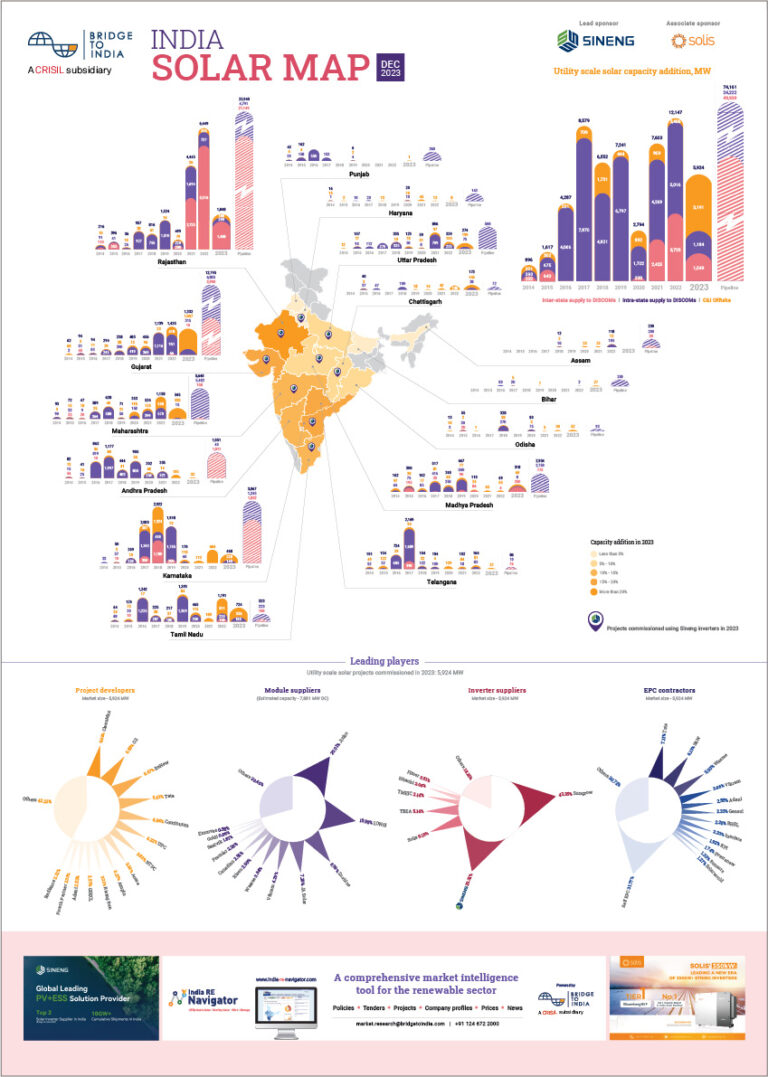As a part of extensive market research, Market Intelligence at BRIDGE TO INDIA publishes topic-based strategy reports on key and most relevant issues in the Indian solar market. These reports are classified as India Solar Strategy Briefs and India Solar Decision Briefs. This is an excerpt from our latest INDIA SOLAR DECISION BRIEF on ‘The REC Mechanism: Viability of solar projects in India’. Download the free report here.
The REC mechanism is relatively new in India and several regulatory loopholes remain. The Central Energy Regulatory Commission (CERC) plans to apply modifications to overcome certain challenges.
- REC prices over the lifetime of the project must reflect the current capital cost, which is an unfair disadvantage as the capital costs are made upfront
- Uneven cash flows and year-end spikes in the REC prices are results of the infrequent annual implementation of RPOs.
- Currently off-grid projects are excluded from the REC mechanism
- Regulations regarding net-metering schemes in India are presently absent
The CERC is considering several changes to the regulations which would be implemented in the coming months. Some of these are:
1. Vintage based multiplier: One of the major concerns is that REC prices over the lifetime of the project must reflect the current capital cost. REC prices would depreciate over time, reflecting the falling cost of capital of a solar plant. This would unfairly disadvantage REC projects since the capital costs are made upfront. To circumvent this problem, the CERC is mulling a vintage based multiplier. In this mechanism the solar REC projects commissioned in the period 2012-2017 will be issued a multiplicative factor. This factor would be equal to the fall in CAPEX from 2012 to 2017. This factor would be used to issue additional RECs. Assuming that the capital cost falls by 50% in 2017, every REC issued in 2012 would be worth two RECs in 2017.
2. Quarterly fulfilment of RPO: In order to ensure a smoother cash-flow, the CERC is considering a quarterly implementation of the RPOs. This would distribute more evenly throughout the year and prevent year-end spikes in the REC prices. Such a regulation would be beneficial to both project developers (cash-flow) and the obligated entities (year-end high prices).
3. Net Metering: The net-metering scheme being considered by the CERC includes the following topics:
- Connection of renewable energy source to the grid at lower voltages
- Accounting and billing
- Safety standards and technical requirements
- Taxes and duties (or waivers) for self-generated electricity
- An overarching policy framework for distributed energy generation
These regulations would ensure that there is a well-defined policy framework for connecting small scale solar power projects onto the grid. This will reduce the likelihood of unnecessarily delays and complications in such projects.
Secondly, one of the major concerns for such REC projects is over-generation. Instances when the supply exceeds the demand (building is empty, holidays, exceptionally sunny days, etc.), the excess power can be fed into the grid and consumed at a later stage. Such banking regulations are also under discussion and would come as a boon to solar project developers under the REC mechanism.
4. REC for off-grid: Currently off-grid projects are excluded from the REC mechanism. However, with a comprehensive metering policy, the CERC intends to include off-grid projects under the REC mechanism. The main issue with off-grid projects is that responsibility cannot be assigned to the DISCOM for a periodic reading of the solar meter, accounting and reporting the power generated to the SLDC. The DISCOM is currently incentivized to carry out these functions only if the project is grid connected.












